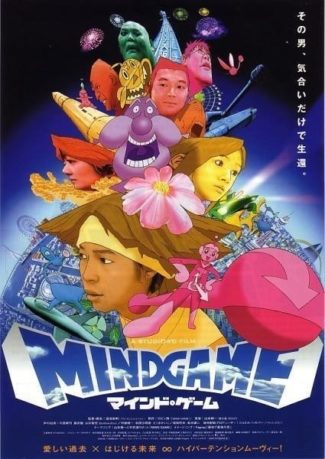 An extremely well-regarded anime feature that premiered back in 2004 yet didn’t receive US distribution until fourteen years later. Better late than never, I guess, although I’m not entirely sold on the film. I admire its technical qualities, certainly, but have never found it an especially involving or cohesive viewing experience.
An extremely well-regarded anime feature that premiered back in 2004 yet didn’t receive US distribution until fourteen years later. Better late than never, I guess, although I’m not entirely sold on the film. I admire its technical qualities, certainly, but have never found it an especially involving or cohesive viewing experience.
Based on a manga by Robin Nishi, MIND GAME is about a character named, appropriately enough, Robin Nishi, an aspiring manga artist whose girlfriend has decided to leave him for another guy. While drowning his sorrows in a local bar Nishi finds himself in the middle of a mob shoot-out, during which he’s shot (in the ass!) and, it seems, killed.
From there Nishi is plunged into a hallucinatory reality in which he’s forced to take stock of his uneventful and largely wasted life. Nishi’s odyssey begins with his death replayed in video game format, and harassment by creatures that appear to have been lifted from a children’s cartoon show.
He’s given a second chance at life, surviving the shooting that vanquished him from the earthly plain and offing the shooter. From there Nishi takes off in one of the gangster’s cars with his ex-Gf and another young woman in tow. He’s pursued by gangsters in a chase that traverses a lengthy highway, a doll factory and a raging sea, and winds up depositing him and the gals in the belly of a whale.
Inside the whale Nishi and co. find a rotting schooner whose sole inhabitant is a crazy old man, who leads them to a private party pad he’s created with assorted bits of detritus. There the three frolic to their hearts’ content as Nishi further takes stock of his life in a succession of surreal hallucinations. He realizes he’s been too passive, and resolves to lead a more assertive, risk-taking existence—if, that is, he and the gals can make it out of the whale!
All of this is gorgeously designed and executed in a variety of contrasting animation styles that range from photorealistic to surreal and expressionistic, often in direct imitation of popular anime tropes (the film often feels like a PULP FICTION-esque mash-up), all rendered in bold primary colors. Nishi is portrayed as a skinny dork with a disproportionately large head whose mouth has a tendency to grow to comically massive size. The depictions of him and the other characters are often intercut with rotoscoped footage of real people in the roles, for reasons (metaphorical? symbolic?) that are never made clear.
Director Masaaki Yusasa isn’t above using overt surrealism to make his points, as when Nishi, feeling alienated from his fellow humans, is shown seated on a stool that for no evident reason moves far away from everyone else in the frame. Add to that the frequently outré visual compositions (Yuasa especially favors distorted lenses) and an evident love of esoteric detail (such as a tiny robot who appears on a character’s shoulder, and is given a number of pertinent close-ups despite having no direct bearing on the action), and you’ve got a film that may well contain too much assorted weirdness. Nor is Yusasa averse to adolescent silliness, as in a dance sequence that puts special emphasis on the dancers’ crotches and breasts, and also a fantasy scene involving a young woman excreting cosmonauts into a toilet.
To be sure, the film climaxes with a tremendous action sequence involving physical transformation that nearly inspired me to revise my negative opinion…but not quite. Innovative and visually rapturous MIND GAME is, but involving and cohesive it definitely isn’t.
Vital Statistics
MIND GAME
Studio 4oC/Asmik Ace Entertainment/Beyond C.
Director: Masaaki Yuasa
Producer: Yutaka Suzuki, Rika Hatekeda
Screenplay: Robin Nishi, Masaaki Yuasa
(Based on a manga by Robin Nishi)
Editing: Keiko Mizuta
Cast (voices): Koji Imada, Sayaka Maeda, Takashi Fuji, Seiko Takuma, Tomomitsu Yamaguchi, Toshio Sakata, Joji Shimaki, Rintarou Nishi, Kenichi Chujou
